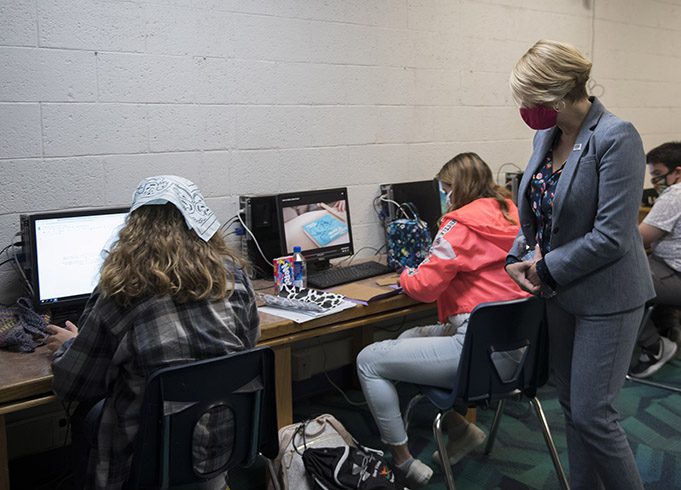RALEIGH — The first quarter of state Superintendent Catherine Truitt’s first year on the job has been busy. She’s dealt with issues ranging from COVID-19 mitigation to literacy and learning loss to the controversy surrounding Critical Race Theory, and North State Journal recently sat down with Truitt to discuss it all.
“The job of the state superintendent is to lead the administrative agency that is the arm of the State Board of Education,” Truitt said, adding that the agency falls under the executive branch. “And as the leader of the Department of Public Instruction, I lead the staff that does the work that comes to us by state board policy or by statute.”
Earlier this year, after vocal opposition from Republican Lt. Gov. Mark Robinson, the SBOE voted to approve a planned revision to the state’s Social Studies Standards, which critics said contained Critical Race Theory (CRT) themes. As a board member, Truitt was involved in these debates.
“I think there’s a lot of misunderstanding about what Critical Race Theory is. It is not a curriculum, it is not a program,” said Truitt. “It is an idea and a theory, pieces of which sometimes permeate everything from a comment that an adult in a school may make all the way down to a particular assignment that is given or to a training that could be given by a district.”
Neither the SBOE, DPI nor the state superintendent has authority over local district instruction decisions, local policies or curriculum materials.
That distinction is important when it comes to the topic of the political bias in the classroom — and the recent uproar over Critical Race Theory — which has frustrated parents across the state looking to the SBOE or Truitt to act.
Truitt was met with some criticism for her support of House Bill 324, which passed the N.C. House on May 12. She says she was asked to weigh in on the bill and that she provided her support based on the fact that the bill does not specifically name Critical Race Theory but rather protects all students from discrimination.
Multiple House Democrats in the General Assembly spoke against the bill before it headed to the Senate.
State Rep. James Gailliard (D-Nash) called the bill “anti-education” and a “don’t-hurt-my-feelings bill,” while state Rep. Kandie Smith (D-Pitt) compared it to “book burning.”
“I have heard many detractors of the bill claim that we all know what the intent of this bill is, and my response to that is, no, you don’t. None of us know what the intent is. All we have to go on is the language in the bill, and I see language that attempts to prohibit a classroom from elevating or condemning one group over another,” said Truitt.

Truitt said her biggest issue with CRT is that the theory asserts racism is inherent and that it can’t be amended. She said proponents would say that the racism is “self-perpetuating and that people are irredeemable, and that conflicts with my faith as well.”
Another issue, according to Truitt, is how Critical Race Theory supporters have caused confusion by co-opting and altering terms used in education such as “equity.”
“It’s important to define what equity and education mean, because we’re starting to lose our way in this battle of ideologies. Equity in education means providing every child what they need at the time they need it,” said Truitt. “It does not mean ensuring equal outcomes.”
Truitt cited the formation of an office of equity at DPI whose deputy superintendent oversees Exceptional Children in that division. The Exceptional Children Division ensures students with disabilities develop intellectually, physically, emotionally, and vocationally through an Individualized Education Program (IEP).
“Exceptional Children is an area that we need to make sure is equitable because it costs more to educate an exceptional child, with an EC designation, than it does someone who does not have one,” Truitt said.
Another example of equity is meeting the needs of Academically and Intellectually Gifted (AIG) students and students who accelerated while learning remotely, Truitt said.
Another battle is also emerging: masks in schools. Parents in counties like Guilford, Iredell, Moore and Wake have been vocal at school board meetings about removing masks in schools.
During the May 13 meeting of the SBOE, the ABC Science Collaborative (ABCSC) and officials with the N.C. Department of Health and Human Services (NCDHHS) presented updates about COVID-19 in schools, which included vaccination information and a conversation about masks.
Following the meeting presentations, Truitt asked what conditions or “critical mass” need to be present in order for the masking order to be lifted in our schools and whether or not the orders would be different for the different grade levels.
NCDHHS state health director and chief medical officer Dr. Elizabeth Tilson responded, saying transmission is higher indoors than outdoors, but did not directly answer Truitt’s question about conditions or metric goals.
Tilson ultimately said they think mask wearing will “still be recommended” and that NCDHHS believes “masks in schools will be a really good idea for a long time.” She also said they would have to continue “reassessing” the rate of spread and the rates of immunizations in order to make determinations on masks.
“I didn’t know how I could have been more clear, and the answer was basically, we don’t know yet,” Truitt told North State Journal on determining how masking was the key factor or not.
Truitt said that county superintendents are telling her that their communities will “rebel if they have to wear a mask this fall” and that NCDHHS’s push for vaccinating children is also meeting with parental resistance.
“Let me be clear. I am never going to advocate that children under 12 need to be vaccinated in order for the mask mandate to come off,” said Truitt.
The day before the SBOE meeting, NCDHHS pushed out emails about vaccinations for children, many addressed to minors and not their parent or guardian.
The message said that those getting the email did so because their “health care provider, employer, or a partner organization pre-registered you to receive a COVID-19 vaccine,” there was a scheduled a COVID-19 vaccine appointment, or the recipient had given their email when they got a COVID-19 vaccine.



